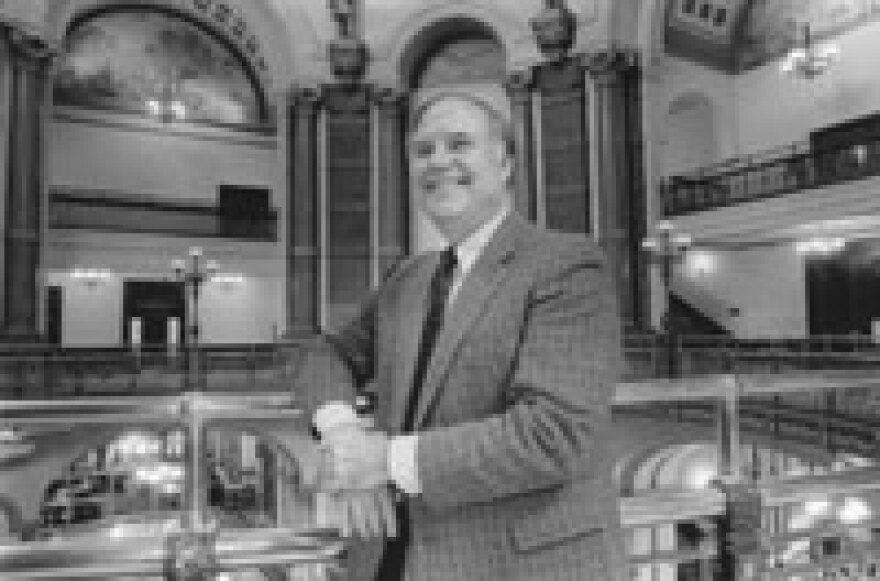Reporters are a talkative lot, so when a bunch of them get together, they swap a lot of war stories. For those covering state government, a favored venue is the national conference of Capitolbeat, the Association of Capitol Reporters and Editors. And when Illinois scribes recount the misdeeds of our elected leaders to their colleagues from elsewhere around the nation, the reaction is pretty standard — eyes open wide, jaws drop and expressions of incredulity abound.
Every storyteller likes to captivate an audience, of course, so perhaps there's a perverse sense of pride in being able to top just about any account of government corruption elsewhere with the latest from Springfield or Chicago.
Consider one notable three-day span just a few weeks ago. First, federal prosecutors on a Wednesday announced the indictment of Antoin "Tony" Rezko, one of Gov. Rod Blagojevich's top fundraisers and key advisers, for shaking down investment firms wanting to do business with the agency that administers pension plans for suburban and downstate teachers. The Rezko indictment may be the tip of the iceberg, as the feds also are looking into administration hiring and contracting practices. Indeed, the FBI's top man in Chicago, Robert Grant, termed it a "gathering storm" and said investigative efforts were "ongoing, methodical, aggressive and relentless."
Two days later, a federal judge rejected former Gov. George Ryan's request to remain free while he appealed his convictions for racketeering conspiracy, fraud and other offenses. Instead, the judge said Ryan, a Republican, must report to prison January 4 to start serving a six-and-one-half-year sentence.
That's a "two-fer" few other states can match.
In more reflective moments, though, one has to ask why Illinois seems to be such a fertile breeding ground for official misconduct, and more important, what toll does such enduring rot take on the body politic.
In response to the first question, some political scientists point to the state's individualistic political culture, which views politics as a kind of marketplace, in which practitioners pursue personal interests rather than the common good. Politics is all about power, jobs and contracts, not ideology or community values. Big city and smaller county political machines flourish, rewarding friends and punishing enemies. Campaign contributions, not policy analysis, shape government decisions. And members of the public seem to go along, just hoping to get their piece of the action. Call it the Illinois way of doing business.
That's probably as good a broad-brush explanation as any. But what effect does such endemic, bipartisan chicanery have on civic life in Illinois?
In a brochure titled The Cost of Corruption, the Illinois Campaign for Political Reform suggests a number of serious consequences. Corruption undermines the legitimacy of the political process, the reform group argues, and as people lose faith in the system, they become less likely to participate in such activities as voting, running for office or aspiring to careers in government. With a shrinking talent pool for government work, the quality of public services deteriorates as jobs and contracts are awarded based on partisanship and clout, rather than merit, in a sort of vicious cycle.
Polling data suggest folks aren't quite ready to drop out yet, but they are disillusioned with the commitment of state political leaders to meaningful reform. For example, in a Chicago Tribune poll released less than a month before the November gubernatorial election, a plurality said neither major party candidate, Democrat Blagojevich or Republican Judy Baar Topinka, would do a good job of cleaning up government. Responses were not included in that poll for Green Party candidate Rich Whitney, a Carbondale attorney.
In a more reflective moment, though, one has to ask why Illinois seems to be such a fertile breeding ground for official misconduct, and more important, what toll does such enduring rot take on the body politic.
Moreover, though most of the polling occurred before the Rezko indictment, almost two-thirds said Blagojevich failed to keep an earlier campaign promise to end political corruption, and some 60 percent said his administration's corruption level was the same as that of previous administrations.
Though the paper didn't analyze the responses, one supposes the governor's supporters might conclude the political rot is so pervasive — should the Rezko allegations prove true — that not even a well-intentioned reformer like Blagojevich has been able to root it out.
The Rezko indictment likely came as no surprise, though, to Blagojevich critics, many of whom view him as a hypocritical opportunist who parlayed public disgust with Ryan's misdeeds into the governor's office.
Still, Illinoisans aren't ready to throw in the towel on good government, another survey suggests. Three-quarters of respondents rated honesty as the most important value they wanted in state government in a poll conducted last summer for the Joyce Foundation, a longtime reform supporter. Asked whether corruption was so ingrained that reform efforts would be futile, 60 percent disagreed, but almost three-quarters said that unless the influence of money in government were limited, elected officials would not be able to keep their promises on important issues.
By similar margins, respondents said that proposals backed by the reform campaign would make government work better, including ones requiring lobbyists to disclose more details about their activities, providing public financing for some campaigns and barring judicial candidates from taking contributions from interests that may have cases in their courts.
Those measures, along with others to sever pay-to-play links between contributions and contracts, should head the agenda when the 95th General Assembly convenes in January. Illinois' long-suffering voters deserve no less.
Charles N. Wheeler III is director of the Public Affairs Reporting program at the University of Illinois at Springfield.
Illinois Issues, November 2006






